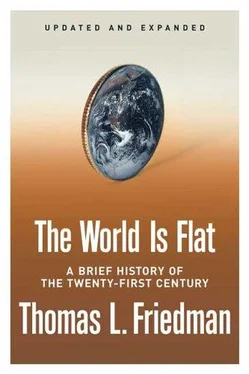Doing Business in 2004 tries to explain each of its points with a few colorful examples: “Teuku, an entreprenuer in Jakarta, wants to open a textile factory. He has customers lined up, imported machinery, and a promising business plan. Teuku's first encounter with the government is when registering his business. He gets the standard forms from the Ministry of Justice, and completes and notarizes them. Teuku proves that he is a local resident and does not have a criminal record. He obtains a tax number, applies for a business license, and deposits the minimum capital (three times national income per capita) in the bank. He then publishes the articles of association in the official gazette, pays a stamp fee, registers at the Ministry of Justice, and waits 90 days before filing for social security. One hundred sixty-eight days after he commences the process, Teuku can legally start operations. In the meantime, his customers have contracted with another business.
“In Panama, another entrepreneur, Ina, registers her construction company in only 19 days. Business is booming and Ina wants to hire someone for a two-year appointment. But the employment law only allows fixed-term appointments for specific tasks, and even then requires a maximum term of one year. At the same time, one of her current workers often leaves early, with no excuse, and makes costly mistakes. To replace him, Ina needs to notify and get approval from the union, and pay five months' severance pay. Ina rejects the more qualified applicant she would like to hire and keeps the underperforming worker on staff.
“Ali, a trader in the United Arab Emirates, can hire and fire with ease. But one of his customers refuses to pay for equipment delivered three months earlier. It takes 27 procedures and more than 550 days to resolve the payment dispute in court. Almost all procedures must be made in writing, and require extensive legal justification and the use of lawyers. After this experience, Ali decides to deal only with customers he knows well.
“Timnit, a young entrepreneur in Ethiopia, wants to expand her successful consulting business by taking a loan. But she has no proof of good credit history because there are no credit information registries. Although her business has substantial assets in accounts receivable, laws restrict her bank from using these as collateral. The bank knows it cannot recover the debt if Timnit defaults, because courts are inefficient and laws give creditors few powers. Credit is denied. The business stays small.
“Having registered, hired workers, enforced contracts, and obtained credit, Avik, a businessman in India, cannot make a profit and goes out of business. Faced with a 10-year-long process of going through bankruptcy, Avik absconds, leaving his workers, the bank, and the tax agency with nothing.”
If you want to know why two decades of macroeconomic reform wholesale at the top have not slowed the spread of poverty and produced enough new jobs in key countries of Latin America, Africa, the Arab world, and the former Soviet Empire, it is because there has been too little reform retail. According to the IFC report, if you want to create productive jobs (the kind that lead to rising standards of living), and if you want to stimulate the growth of new businesses (the kind that innovate, compete, and create wealth), you need a regulatory environment that makes it easy to start a business, easy to adjust a business to changing market circumstances and opportunities, and easy to close a business that goes bankrupt, so that the capital can be freed up for more productive uses.
“It takes two days to start a business in Australia, but 203 days in Haiti and 215 days in the Democratic Republic of Congo,” the IFC study found. “There are no monetary costs to start a new business in Denmark, but it costs more than five times income per capita in Cambodia and over thirteen times in Sierra Leone. Hong Kong, Singapore, Thailand and more than three dozen other economies require no minimum capital from start-ups. In contrast, in Syria the capital requirement is equivalent to fifty-six times income per capita... Businesses in the Czech Republic and Denmark can hire workers on part-time or fixed-term contracts for any job, without specifying maximum duration of the contract. In contrast, employment laws in El Salvador allow fixed-term contracts only for specific jobs, and set their duration to be at most one year... A simple commercial contract is enforced in seven days in Tunisia and thirty-nine days in the Netherlands, but takes almost 1,500 days in Guatemala. The cost of enforcement is less than 1 percent of the disputed amount in Austria, Canada and the United Kingdom, but more than 100 percent in Burkina Faso, the Dominican Republic, Indonesia... and the Philippines. Credit bureaus contain credit histories on almost every adult in New Zealand, Norway and the United States. But the credit registries in Cameroon, Ghana, Pakistan, Nigeria and Serbia and Montenegro have credit histories for less than 1 percent of adults. In the United Kingdom, laws on collateral and bankruptcy give creditors strong powers to recover their money if a debtor defaults. In Colombia, the Republic of Congo, Mexico, Oman and Tunisia, a creditor has no such rights. It takes less than six months to go through bankruptcy proceedings in Ireland and Japan, but more than ten years in Brazil and India. It costs less than 1 percent of the value of the estate to resolve insolvency in Finland, the Netherlands, Norway and Singapore-and nearly half the estate value in Chad, Panama, Macedonia, Venezuela, Serbia and Montenegro, and Sierra Leone.”
As the IFC report notes, excessive regulation also tends to hurt most the very people it is supposed to protect. The rich and the well connected just buy or hustle their way around onerous regulations. In countries that have very regulated labor markets where it is difficult to hire and fire people, women, especially, have a hard time finding employment.
“Good regulation does not mean zero regulation,” concludes the IFC study. “The optimal level of regulation is not none, but may be less than what is currently found in most countries, and especially poor ones.” It offers what I call a five-step checklist for reform retail. One, simplify and deregulate wherever possible in competitive markets, because competition for consumers and workers can be the best source of pressure for best practices, and overregulation just opens the door for corrupt bureaucrats to demand bribes. “There is no reason for Angola to have one of the most rigid employment laws if Portugal, whose laws Angola adapted, has already revised them twice to make the labor market more flexible,” says the IFC study. Two, focus on enhancing property rights. Under de Soto's initiative, the Peruvian government in the last decade has issued property titles to 1.2 million urban squatter households. “Secure property rights have enabled parents to leave their homes and find jobs instead of staying in to protect the property,” says the IFC study. “The main beneficiaries are their children, who can now go to school.” Three, expand the use of the Internet for regulation fulfillment. It makes it faster, more transparent, and far less open to bribery. Four, reduce court involvement in business matters. And last but certainly not least, advises the IFC study, “Make reform a continuous process... Countries that consistently perform well across the Doing Business indicators do so because of continuous reform.”
In addition to the IFC's criteria, reform retail obviously has to include expanding the opportunities for your population to get an education at all levels and investing in the logistical infrastructure-roads, ports, telecommunications, and airports-without which no reform retail can take off and collaboration with others is impossible. Many countries today still have telecommunications systems dominated by state monopolies that make it either too expensive or too slow to get highspeed Internet access and wireless access, and to make cheap longdistance and overseas phone calls. Without reform retail in your telecom sector, reform retail in the other five areas, while necessary, will not be sufficient. What is striking about the IFC's criteria is that a lot of people think they are relevant only for Peru and Argentina, but in fact some of the countries that score worst are places like Germany and Italy. (Indeed, the German government protested some of the findings.)
Читать дальше












